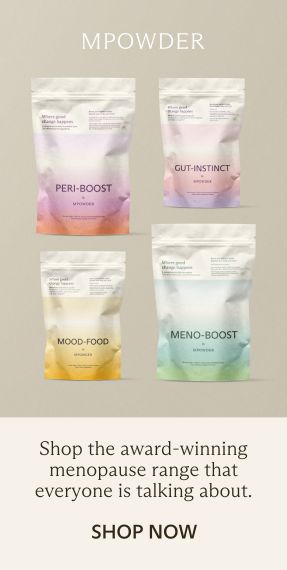Over 60% of our community cite anxiety as one of the most persistent symptoms during their menopause transition. It’s why we spent 2 years formulating our 5 star capsule formulation Mood Food - which targets cognitive function, mood, anxiety and sleep.
One of oestrogen’s key roles is to support serotonin production, the "feel-good" neurotransmitter that regulates mood and emotional resilience. As oestrogen declines, serotonin levels can dip, leading to increased anxiety, low mood, and heightened stress sensitivity.
The good news? What you eat can make a real difference to hormones and anxiety. Here’s how to support your hormones and anxiety naturally with the right foods.
1. Prioritise Omega-3 Fatty Acids
Omega-3 fatty acids play a crucial role in hormone production and brain health. They help reduce inflammation, support neurotransmitter function, and have been shown to lower anxiety symptoms. While many people associate omega-3s with fish like mackerel and sardines, there are plenty of plant-based sources that provide ALA (alpha-linolenic acid), which the body converts into DHA and EPA too. Look to chia seeds, flaxseeds, walnuts - sprinkling into porridge / overnight oats or salads and stews.
2. Boost Fibre Intake for Gut Health
Your gut and brain are directly connected via the gut-brain axis, and the bacteria in your gut play a key role for hormones and anxiety, hormone regulation and mood. Fibre feeds beneficial gut bacteria, helping to reduce inflammation and support serotonin production. We love lentils and chickpeas for their ease of use; and nutritional punch. Oats, chia and flaxseeds, leafy greens and berries are great too.
3. Phytoestrogens: Natural Hormone Modulators
Phytoestrogens are natural compounds in plants that mimic oestrogen in the body. Including them in your diet may help stabilise mood and reduce menopause-related anxiety. Mother nature’s bounty often has a multitude of benefits! Flaxseeds are a great source of phytoestrogens - as is fermented soy like tempeh or miso and sesame seeds.
4. Blood Sugar Stability and Mood
We’re learning more and more about the negative impact of ultra-processed food on our health. A diet high in refined sugars and processed foods causes blood sugar crashes, which can worsen anxiety, fatigue, and mood swings. And in midlife, disrupt our gut microbiota at a point where hormonal fluctuations are already causing imbalances. A focus on steadying blood sugar spikes can make a big difference to how we feel. Look to include more whole grains on your plate - like quinoa, brown rice or oats. Nuts and seeds can make for delicious alternatives to the afternoon biscuit tin too! And, if hunger persists between meals, pay close attention to the amount of protein you’re getting each day. Few of us eat enough.
5. Hydration and Cognitive Function
Research shows that even mild dehydration can cause fatigue, confusion, and heightened stress responses, all of which worsen anxiety symptoms. Drinking enough each day is often about establishing a habit. It requires 2-3 weeks of conscious effort before your body becomes your reminder and reaching for water (flavoured, hot, or at room temperature -what matters here is take up not penitence!) becomes second nature. We love Sandie Fredriksson’s recommendation to pick a drink bottle you love to bring a little joy into the effort too!
Final thoughts
Botanicals may be harder to work into recipes, but can really support our minds with anxiety. Check out the reviews for our multi-award winning MOOD-FOOD to learn more.
References
-
Lespérance et al., JAMA Psychiatry, 2018 - https://jamanetwork.com/journals/jamapsychiatry/fullarticle/
-
Kuan et al., Journal of Clinical Psychiatry, 2019 - https://www.psychiatrist.com/jcp/depression/omega-3-fatty-acids-mental-health/
-
Valles-Colomer et al., Nature Microbiology, 2019 - https://www.nature.com/articles/s41564-019-0428-y
-
Schmidt et al., Neuropsychiatry Research, 2020 - https://link.springer.com/article/10.1007/s40263-020-00721-2
-
Kim et al., Journal of Menopausal Medicine, 2020 - https://www.ncbi.nlm.nih.gov/pmc/articles/PMC7556830/
-
Messina, Menopause Journal, 2020 - https://journals.lww.com/menopausejournal/Abstract/publishahead/Soy_foods_a
d_supplementation_for_cardio_metabolic.98905.aspx -
Gangwisch et al., American Journal of Psychiatry, 2019 - https://ajp.psychiatryonline.org/doi/10.1176/appi.ajp.2018.18060729
-
Rao et al., Nutritional Neuroscience, 2019 - https://www.tandfonline.com/doi/full/10.1080/1028415X.2019.1585542
-
Popkin et al., Frontiers in Nutrition, 2020 - https://www.frontiersin.org/articles/10.3389/fnut.2020.00020/full
-
Armstrong et al., Journal of Nutrition, 2019 - https://academic.oup.com/jn/article/149/11/1997/5489441
Share Twitter Facebook Pinterest

